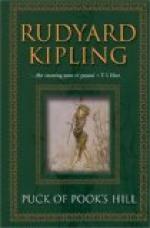’When the tide dropped he thought he stood on old armour, but feeling with his toes, he raked up bar on bar of soft gold. Some wicked treasure of the old days put away, and the secret cut off by the sword. I have heard the like before.’
‘So have we,’ Una whispered. ‘But it wasn’t wicked a bit.’
’Elias took a little of the stuff with him, and thrice yearly he would return to Pevensey as a chapman, selling at no price or profit, till they suffered him to sleep in the empty room, where he would plumb and grope, and steal away a few bars. The great store of it still remained, and by long brooding he had come to look on it as his own. Yet when we thought how we should lift and convey it, we saw no way. This was before the Word of the Lord had come to me. A walled fortress possessed by Normans; in the midst a forty-foot tide-well out of which to remove secretly many horse-loads of gold! Hopeless! So Elias wept. Adah, his wife, wept too. She had hoped to stand beside the Queen’s Christian tiring-maids at Court when the King should give them that place at Court which he had promised. Why not? She was born in England—an odious woman.
’The present evil to us was that Elias, out of his strong folly, had, as it were, promised the King that he would arm him with more gold. Wherefore the King in his camp stopped his ears against the Barons and the people. Wherefore men died daily. Adah so desired her place at Court, she besought Elias to tell the King where the treasure lay, that the King might take it by force, and—they would trust in his gratitude. Why not? This Elias refused to do, for he looked on the gold as his own. They quarrelled, and they wept at the evening meal, and late in the night came one Langton—a priest, almost learned—to borrow more money for the Barons. Elias and Adah went to their chamber.’
Kadmiel laughed scornfully in his beard. The shots across the valley stopped as the shooting party changed their ground for the last beat.
‘So it was I, not Elias,’ he went on quietly, ’that made terms with Langton touching the fortieth of the New Laws.’
‘What terms?’ said Puck quickly. ’The Fortieth of the Great Charter says: “To none will we sell, refuse, or delay right or justice."’
’True, but the Barons had written first: To no free man. It cost me two hundred broad pieces of gold to change those narrow words. Langton, the priest, understood. “Jew though thou art,” said he, “the change is just, and if ever Christian and Jew came to be equal in England thy people may thank thee.” Then he went out stealthily, as men do who deal with Israel by night. I think he spent my gift upon his altar. Why not? I have spoken with Langton. He was such a man as I might have been if—if we Jews had been a people. But yet, in many things, a child.
’I heard Elias and Adah abovestairs quarrel, and, knowing the woman was the stronger, I saw that Elias would tell the King of the gold and that the King would continue in his stubbornness. Therefore I saw that the gold must be put away from the reach of any man. Of a sudden, the Word of the Lord came to me saying, “The Morning is come, O thou that dwellest in the land."’




